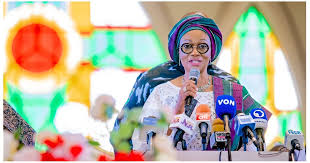Nigeria’s First Lady, Senator Oluremi Tinubu, has made a passionate appeal to the National Assembly to formally recognize the Office of the First Lady in the nation’s constitution, both at the federal and state levels. Drawing inspiration from the institutional model in the United States, Senator Tinubu argued that formal legal backing would significantly boost the office’s capacity to deliver impactful programs across the country.
Speaking after her second quarterly strategic meeting with state governors’ wives and Renewed Hope Initiative (RHI) coordinators at the State House in Abuja, she emphasized the need to transition from informal influence to institutional authority. “We are wives, we want to see our husbands succeed. They are like trees, and we the branches are perching on them,” she said, stressing the importance of support structures that empower presidential and gubernatorial spouses to contribute meaningfully to national development.
Citing achievements recorded under the RHI banner, Tinubu noted that despite limited funding, significant strides had been made, particularly in education. “We took 47 indigent students and gave them N1 million scholarships each,” she revealed. “We could have done more if we had official support and legal backing.” She underscored that with greater access to funds and legal legitimacy, initiatives such as youth empowerment, women’s development, and health advocacy could reach far more Nigerians.
The First Lady also used the platform to strongly condemn the recent deadly attacks in Borno and Plateau States, where dozens were killed in separate incidents, including a suicide bombing at a Konduga fish market. With visible emotion, she called the attacks “evil, very evil,” and questioned their resurgence at a time when the nation was beginning to stabilize. “As mothers and women, we have to pray more for our nation,” she said. “The killings in Borno and Plateau are not new, but why are they resurfacing now when the nation is getting better and people are beginning to reckon with us?”
Calling on Nigerian women to act as moral anchors, Senator Tinubu urged them to intensify prayers for national unity and healing, adding that spiritual and civic responsibility must go hand-in-hand in countering evil. “We all must contribute to national healing and progress in any way we can,” she said.
The First Lady also highlighted public health concerns, urging the governors’ wives to intensify their efforts in the fight against HIV/AIDS, hepatitis, tuberculosis, syphilis, and cervical cancer. She charged them to use their platforms to strengthen community health education and encourage preventive care.
In a major new announcement, Senator Tinubu unveiled the Flow With Confidence initiative, which will see the distribution of 10,000 cartons of sanitary pads to each of the 36 states of the federation. This is aimed at promoting menstrual hygiene and restoring dignity to adolescent girls, particularly in underserved rural communities.
Additionally, she revealed that the Renewed Hope Initiative would soon inaugurate its Environment Club/Society — a nationwide program aimed at fostering environmental awareness among Nigerian youths. This new club will focus on grassroots environmental advocacy, recycling, and community cleanliness initiatives in schools and local governments.
The high-level meeting was attended by the wife of the Vice President, Hajia Nana Shettima; the wife of the Speaker of the House of Representatives; the wife of the Deputy Senate President; and 24 state governors’ wives. The event reinforced the First Lady’s commitment to women-led governance support and community-driven transformation.
As momentum builds around the Renewed Hope Initiative, Senator Tinubu’s call for constitutional recognition of her office may reignite long-standing debates on the legitimacy, influence, and governance role of First Ladies in Nigeria’s political system — a discussion that could have far-reaching implications for democratic inclusion and institutional accountability.



